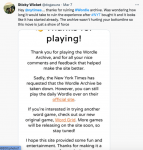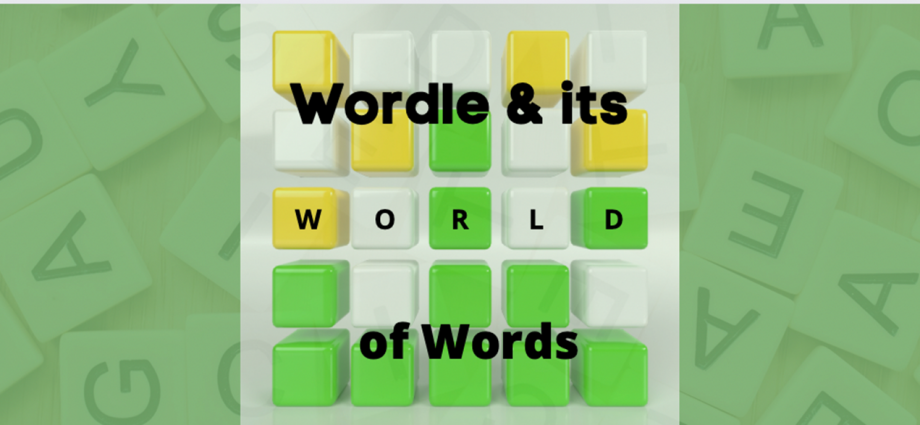Author: Jacqueline Yipp, Graphics: Acasia Giannakouros
The BRB Bottomline
Wordle, a new and rising online game, has been recently purchased by The New York Times. This decision was met with negative backlash from users who fear that the free game will be put behind a paywall.
What is Wordle?
Wordle is a daily word guessing game that gives the player six tries to guess a five-letter word. If a letter is correctly guessed in the right place, the tile will turn green. If a correct letter is guessed but it was placed in a different spot than in the correct word, the tile will turn yellow. If a guessed word’s letters aren’t in the correct word, the tile will turn gray. The game itself is simple, yet teases your brain as you try to figure out the word.
The game was founded by Josh Wardle, a software engineer who currently resides in New York. Wardle created the game for him and his partner, Palak Shah, in 2020, and drew inspiration from the TV game show “Lingo”. The game was originally created in 2013, but was quickly discarded after lack of interest from his friends. However, when COVID-19 hit, he decided to resurrect the game, in hopes that people would want to play the game while stuck at home. Previously, players were able to play multiple rounds in one day, as opposed to present-day, where there is only one word given per day.
Wordle Lookalikes
Over a million people play Wordle daily, bringing success to the online game – enough to the point where there are various copycat versions of the game. Some include Taylordle, modeled after five-letter words that have to do with Taylor Swift; Octordle, which gives users thirteen tries to guess eight different words at the same time; BTS Wordle, modeled after the global boyband BTS; Dordle, a game in which you get seven tries to guess two words simultaneously; and Nerdle, a math-based Wordle knock-off that gives users six tries to guess the math equation. Some Berkeley students even came up with Croadle, in which users are given five tries to guess a main dinner item at Crossroads, one of the dining halls.
The New York Times Takeover
In January of 2022, The New York Times acquired Wordle for over $1,000,000. The announcement was sudden and met with mixed reactions from the general public. Some people were fearful of The New York Times putting the game behind a paywall as the NYT is known to charge users to play their games.
Is the Takeover Good or Bad?
From a business standpoint, The New York Times acquiring Wordle can be seen as beneficial yet also potentially harmful. The purchase will help both The New York Times and creator Josh Wardle as Wardle will get a seven-digit sum of money from selling his game, and The New York Times will get a chance to capitalize on one of the most popular games on the internet. Wardle even mentioned how he is overwhelmed and “thrilled” about The New York Times taking over.
However, some may argue that there are negative sides to the acquisition as well. Even though both the company who owns Wordle and its founder both benefit from the purchase, users may suffer consequences, such as being required to pay to play the game or having a hard time figuring out more challenging words – especially if the buyer is a journalistic publishing company. This leaves it up to The New York Times to decide how to relish Wordle’s newfound popularity.
Community Feedback
…In numbers
Wordle’s sudden rise in popularity has brought many benefits. On November 1, 2021, only 90 people played the game. Fast forward to mid-January 2022, and around 300,000 people played the game daily. Wordle now has well over a million players per day. Although people are worried about the direction The New York Times will take with Wordle, it seems as if the number of players is only increasing.
…On social media
Although the number of users has been increasing, the feedback hasn’t always been positive. In early March, The New York Times asked Noah, aka metzgermedi, to take down Wordle Archives, a fanmade account dedicated to posting previous words so that people can play multiple rounds per day. This request was met with a lot of backlash, especially from the users of Wordle Archive.

One user took it to Twitter to complain to The New York Times about Wordle Archive’s shut down. (via Twitter)

Another user complains about how The New York Times requested to take down Wordle Archives. (via Twitter)
Other users have been complaining about how the five letter words have become more difficult to solve. Words like ‘cynic’ and ‘tacit’ have been used recently, which has frustrated people as they aren’t commonly used words

The New York Times has been generating increasingly difficult words that people have been complaining about. (via Twitter)

People directly blaming The New York Times for the harder increase in words. (via Twitter)
The Future
Wordle’s Potential Paywall
One reason as to why people are worried about The New Times’s acquisition is their past history of putting games behind a paywall. The New York Times offers games like The Crossword, Spelling Bee, Letter Boxed, Tiles, and more, all only accessible with a paid subscription. Because of this, users fear that The New York Times will start adding Wordle to the subscription, meaning that people would have to pay to play, instead of playing for free. However, The Daily Mini by The New York Times is free, leaving some people hopeful and optimistic that Wordle will remain free.
5-Letter Words
Similarly, there are only a finite amount of 5-letter words. Although Wordle is a fairly new game, it is only a matter of time before the number of 5-letter words runs out, especially since the purpose of the game is to guess a different word per day, with no repeated or plural words. So what does this mean for the future of Wordle? Will there ever be an end to this instant success game? If so, will it be from the limited possibilities of five-letter words, from the negative feedback and fear of a paywall, or from an actualized paywall?
Take-Home Points
- The New York Times recently purchased Wordle for seven figures
- There have been mixed reviews about the acquisition, mainly negative due to the harder words
- People also fear that Wordle will soon be put behind a paywall, similar to some of The New York Time’s other online games

